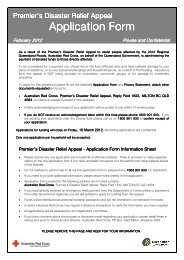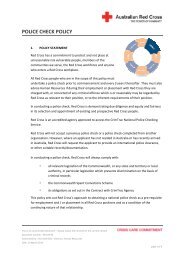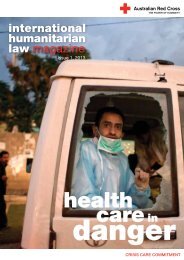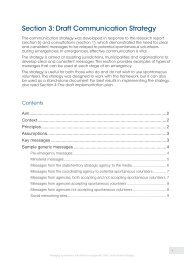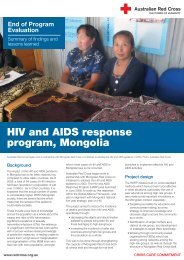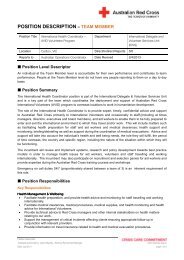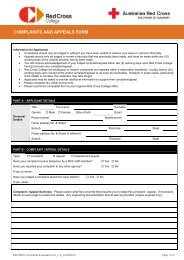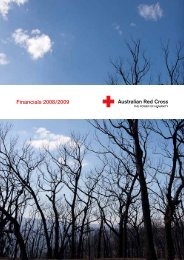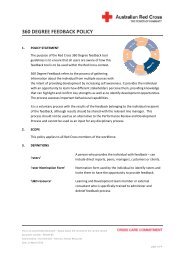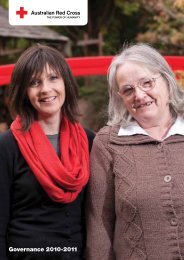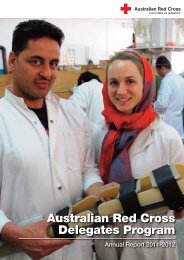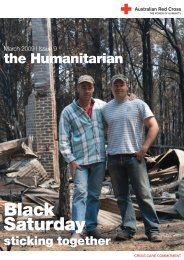Humanitarian - Australian Red Cross
Humanitarian - Australian Red Cross
Humanitarian - Australian Red Cross
You also want an ePaper? Increase the reach of your titles
YUMPU automatically turns print PDFs into web optimized ePapers that Google loves.
TK (Tarin Kowt) in the DMT (Detention<br />
Management Team) managing the ISA<br />
(Initial Screening Area) and handling<br />
all roles apart from TQ (Tactical<br />
Questioning). How does a civilian<br />
keep up<br />
In real life, when an ICRC protection<br />
delegate visits detainees, there are<br />
strict standard procedures. On arrival,<br />
the delegate meets authorities and<br />
addresses issues of concern, and<br />
discusses how the visit will take place.<br />
ICRC will then check or establish<br />
a register of all inmates, conduct<br />
interviews with detainees without<br />
any witness, offer the opportunity<br />
of a <strong>Red</strong> <strong>Cross</strong> family message and<br />
conduct a thorough inspection of<br />
every part of the facility. The objective<br />
is to monitor conditions, prevent<br />
ill-treatment or disappearances and<br />
assist authorities in meeting their legal<br />
obligations. Independent reporting<br />
is provided to the prison authorities<br />
and their ministerial hierarchy and<br />
remains confidential. While ICRC visits<br />
– repeated, not one-off – in no way<br />
guarantee all is well, they do show<br />
the detaining authorities’ willingness<br />
to work with independent monitors<br />
and show prisoners that they are not<br />
forgotten by the outside world.<br />
In a typical year, ICRC staff visit as<br />
many as 500,000 detainees in more<br />
than 60 countries. Today, because<br />
most detainees are not prisoners-ofwar<br />
in strict legal terms (and different<br />
legal protections apply in internal armed<br />
conflict from international armed conflict),<br />
the ICRC, in agreement with authorities,<br />
visits a much broader range of people<br />
detained as a result of conflict.<br />
How did the inspection of the pretend<br />
ADF facilities go Fortunately, very well.<br />
On the arrival of our team, an interpreter<br />
in civilian clothes was provided by the<br />
ADF and the visit began.<br />
The purpose of ICRC inspections is not<br />
adversarial. Rather, observations made<br />
are the starting point for discussions<br />
aimed at encouraging authorities to<br />
confirm or raise standards, if necessary,<br />
towards those set out in the law.<br />
During the tour of facilities the ICRC<br />
and the MPs examined and discussed<br />
various points – the size of cells and<br />
exercise yards, the requirement of<br />
organising family visits, even for socalled<br />
‘high value’ detainees, sensitivity<br />
to local cultural practices and the<br />
‘comfort’ of detainees being balanced<br />
against security concerns. This to-andfro<br />
negotiation is typical of the way the<br />
system works.<br />
What an experience – to travel with the<br />
ADF and see them in action, observing<br />
the IHL they had been taught, first and<br />
foremost by the Army’s own Command<br />
and Legal Officers, and supported by<br />
<strong>Red</strong> <strong>Cross</strong>.<br />
Yet the trip had its challenges too. Pete<br />
and Eve lived under tough conditions<br />
– coping with tropical humidity, and<br />
sleeping in the open air under the<br />
requisite mosquito nets. And, for a<br />
little extra spice, the exercise had<br />
to be abandoned, and everyone<br />
evacuated twice, just before Cyclone<br />
Anthony was expected and again<br />
when Cyclone Yasi struck. No rest for<br />
the MPs though. Post Yasi they were<br />
re-assigned, supporting ADF recovery<br />
efforts from Townsville to Tully.<br />
Between January and May 2010, the<br />
ICRC carried out an astounding number<br />
of visits in the Afghanistan conflict.<br />
Some 14,000 detainees were reached,<br />
including those held by the Afghan<br />
authorities, US forces, the NATO-led<br />
International Security Assistance Force<br />
and others in the armed opposition.<br />
The ICRC has had a delegation in Kabul<br />
since 1987. But Uruzgan province – a<br />
name now familiar to <strong>Australian</strong>s – has<br />
been a difficult area for the ICRC since a<br />
tragedy in 2003. An El Salvadorian ICRC<br />
water engineer, Riccardo Munguia, was<br />
deliberately targeted, pulled from his car<br />
and killed. Almost all ICRC operations in<br />
the region were suspended, though they<br />
were supported from Kandahar.<br />
An ICRC office was re-opened in<br />
Uruzgan in 2009. It is from that base<br />
that the ICRC now maintains regular<br />
contacts with the ADF base and<br />
detention facility. In other words when<br />
‘our’ Townsville MPs arrive at their<br />
Afghanistan posts they will see the<br />
ICRC practices on which they were<br />
trained replicated exactly. Familiarity<br />
and consistency of approach can only<br />
lead to greater IHL adherence.<br />
– Bev Patterson, <strong>Australian</strong> <strong>Red</strong> <strong>Cross</strong><br />
About The Royal <strong>Australian</strong><br />
Corps of Military Police<br />
The Royal <strong>Australian</strong> Corps of Military<br />
Police is a small highly trained<br />
and professional Corps providing<br />
command support and police support<br />
to the Army and the <strong>Australian</strong> Defence<br />
Force in peace, crisis and conflict on<br />
any operation, anywhere in the world.<br />
Their role covers four key areas: law<br />
enforcement; security; mobility and<br />
manoeuvring support; and internment<br />
and detention. One Military Police<br />
Battalion is the Army’s deployable<br />
Force Element of this Corps.<br />
About the ICRC<br />
The International Committee of the<br />
<strong>Red</strong> <strong>Cross</strong> (ICRC) is an impartial,<br />
neutral and independent organisation<br />
whose exclusively humanitarian<br />
mission is to protect the lives and<br />
dignity of victims of armed conflict<br />
and other situations of violence and<br />
to provide them with assistance.<br />
Page 13





